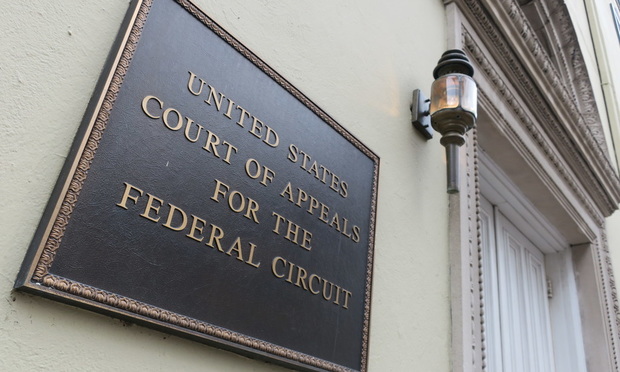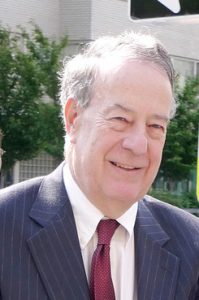'Under a Cloud of Doubt': Patent Practices Pivot Following the Federal Circuit's 'Arthrex' Decision
PTAB practices have been "morphing almost on a daily basis" since the appellate court started weighing in on the PTO's Appointments Clause problem for its 275 administrative patent judges.
December 20, 2019 at 10:00 AM
7 minute read
 U.S. Court of Appeals for the Federal Circuit in Washington D.C.
U.S. Court of Appeals for the Federal Circuit in Washington D.C.
In a way, it was hiding in plain sight.
Twice in the last 10 years, the U.S. Supreme Court has invalidated the appointment of administrative law judges, first to the Public Company Accounting Oversight Board in 2010, and then to the Securities and Exchange Commission in 2018. While at the D.C. Circuit, Judge Brett Kavanaugh spotted the same problem with the librarian of Congress' copyright royalty judges in 2009.
 Judge Kimberly Ann Moore of the United States Court of Appeals for the Federal Circuit. ..
Judge Kimberly Ann Moore of the United States Court of Appeals for the Federal Circuit. ..But when the U.S. Court of Appeals for the Federal Circuit ruled Oct. 31 that the U.S. Patent and Trademark Office's 275 administrative patent judges suffer from the same infirmity, it still caused massive shock waves. And they're reverberating through the patent bar, academia and in Congress.
"I think it's fairly clear that the constitutional structure is under a cloud of doubt right now," University of Virginia law professor John Duffy told a hastily convened panel of the House Judiciary's subcommittee on courts, intellectual property and the internet Nov. 19. Duffy warned that without a congressional fix, that cloud will linger over the Patent Trial and Appeal Board for at least another year or two.
For patent litigators whose practice includes the PTAB, the law has been "morphing almost on a daily basis," said Baker Botts partner Sarah Guske.
If it stands, the decision of Judge Kimberly Moore of the U.S. Court of Appeals for the Federal Circuit in Arthrex v. Smith & Nephew will require the PTAB to rehear 150 to 200 cases. But at least a couple of Federal Circuit judges have already signaled disagreement with Moore's approach. The Justice Department has said it will ask the court to reconsider en banc, and it's anyone's guess what the Supreme Court might do if it reviews the case.
 Judge Timothy Dyk of the U.S. Court of Appeals for the Federal Circuit.
Judge Timothy Dyk of the U.S. Court of Appeals for the Federal Circuit.Among the many decisions facing patent lawyers right now is whether to challenge the legitimacy of PTAB judges, whom they're currently appearing before, in order to ensure that they've preserved the appointments issue depending on how the law shakes out.
"It creates an odd situation," Guske said. Practitioners would be arguing that the judges aren't even authorized to decide whether they can decide. Aside from potentially antagonizing the judges, briefing the Appointments Clause issue eats into the limited words available to address patent validity, she said.
The Federal Circuit has already ruled that for cases that are on appeal, appellants have forfeited the issue if they didn't raise it in their opening appellate briefs.
The goal of Arthrex and the Supreme Court decisions that preceded it is to establish more political accountability for administrative judges. The PTAB judges, who preside over patent validity trials pursuant to the America Invents Act and hear appeals from rejected patent applicants, are classified as inferior officers and are therefore appointed by the secretary of commerce. Moore wrote that because of the power and autonomy conferred on PTAB judges, they are principal officers who must be appointed by the president and confirmed by the Senate.
 Judge Pauline Newman, U.S. Court of Appeals for the Federal Circuit
Judge Pauline Newman, U.S. Court of Appeals for the Federal CircuitBut rather than invalidate all 275 appointments, Moore wrote that going forward, the Federal Circuit could read out a portion of the Patent Act that provides civil service protections to the judges. That way, USPTO director Andrei Iancu would hold enough supervisory power to render them inferior officers, Moore reasoned. She then followed the Supreme Court's approach in 2018's Lucia v. SEC by ordering new hearings before different panels of PTAB judges for cases the PTAB has decided but that aren't yet final on appeal.
Judges Jimmie Reyna and Raymond Chen of the U.S. Court of Appeals of the Federal Circuit concurred in Moore's ruling. But a week later, their colleagues Judges Timothy Dyk and Pauline Newman of the U.S. Court of Appeals for the Federal Circuit wrote in a separate case that Arthrex should apply retroactively, too, so there's no need for new hearings. The next day, still another panel requested briefing on whether Arthrex "sufficiently remedies the alleged unconstitutional appointment," raising the possibility of nuking the PTAB altogether.
Criticism has come in from other quarters. On the Yale/ABA Notice and Comment blog, George Washington University Law School professor Alan Morrison wrote that "it is surely a fiction or perhaps wishful thinking for the Federal Circuit to assert that it was trying to carry out the will of Congress when it eliminated a for-cause removal provision that Congress never included for APJs."
Former PTAB Judge Richard Torczon, now of counsel at Wilson Sonsini Goodrich & Rosati, wrote on IP Watchdog that Moore overlooked In re Alappat, a 1994 en banc Federal Circuit decision that gave the PTO director authority to handpick rehearing panels in order to overturn disfavored decisions. That's a better route for solving the appointments problem, Torczon argued.
 Sarah Guske, Baker Botts partner (Photo: Jason Doiy/ALM)
Sarah Guske, Baker Botts partner (Photo: Jason Doiy/ALM)Attention is already turning to Congress to solve the problem. Duke University School of Law professor Arti Rai said at the Nov. 19 hearing that a fix could be as simple as adding a sentence to the AIA giving the USPTO director authority to overrule decisions. Subcommittee chairman Rep. Hank Johnson, D-Georgia, sounded warm to the idea, but other members of Congress have been critical of the way the AIA has played out, and it's not clear how willing they'll be to support a fix without other reforms. Subcommittee ranking member Rep. Martha Roby, R-Alabama, suggested that raising the burden of proof for invalidity and eliminating the right of hedge funds, trade associations and other third parties to bring challenges might also have to be in the mix.
In the meantime, patent litigators will continue feeling their way through this period of uncertainty. Michael McCabe of McCabe Law said while some clients might be annoyed if their right to a new hearing is forfeited, he doesn't see that as giving rise to malpractice liability. The idea that "you would have won but for the panel not being constitutionally appointed by the president" is mere speculation, McCabe said. There's no guarantee that a new hearing will lead to a different outcome.
Guske and Ropes & Gray partner Matthew Rizzolo said that while it's always possible a new PTAB panel might decide a case differently, they wouldn't expect it to happen very often.
Rizzolo said Arthrex is another reminder that, with the growth of the PTAB, patent litigators and their clients have to "be aware of and pay attention to administrative law issues. And with that comes constitutional law."
This content has been archived. It is available through our partners, LexisNexis® and Bloomberg Law.
To view this content, please continue to their sites.
Not a Lexis Subscriber?
Subscribe Now
Not a Bloomberg Law Subscriber?
Subscribe Now
NOT FOR REPRINT
© 2025 ALM Global, LLC, All Rights Reserved. Request academic re-use from www.copyright.com. All other uses, submit a request to [email protected]. For more information visit Asset & Logo Licensing.
You Might Like
View All
Brownstein Adds Former Interior Secretary, Offering 'Strategic Counsel' During New Trump Term
2 minute read
Weil, Loading Up on More Regulatory Talent, Adds SEC Asset Management Co-Chief
3 minute read
FTC Sues PepsiCo for Alleged Price Break to Big-Box Retailer, Incurs Holyoak's Wrath
5 minute read
Supreme Court Will Hear Religious Parents' Bid to Opt Out of LGBTQ-Themed School Books
Law Firms Mentioned
Trending Stories
- 1How ‘Bilateral Tapping’ Can Help with Stress and Anxiety
- 2How Law Firms Can Make Business Services a Performance Champion
- 3'Digital Mindset': Hogan Lovells' New Global Managing Partner for Digitalization
- 4Silk Road Founder Ross Ulbricht Has New York Sentence Pardoned by Trump
- 5Settlement Allows Spouses of U.S. Citizens to Reopen Removal Proceedings
Who Got The Work
J. Brugh Lower of Gibbons has entered an appearance for industrial equipment supplier Devco Corporation in a pending trademark infringement lawsuit. The suit, accusing the defendant of selling knock-off Graco products, was filed Dec. 18 in New Jersey District Court by Rivkin Radler on behalf of Graco Inc. and Graco Minnesota. The case, assigned to U.S. District Judge Zahid N. Quraishi, is 3:24-cv-11294, Graco Inc. et al v. Devco Corporation.
Who Got The Work
Rebecca Maller-Stein and Kent A. Yalowitz of Arnold & Porter Kaye Scholer have entered their appearances for Hanaco Venture Capital and its executives, Lior Prosor and David Frankel, in a pending securities lawsuit. The action, filed on Dec. 24 in New York Southern District Court by Zell, Aron & Co. on behalf of Goldeneye Advisors, accuses the defendants of negligently and fraudulently managing the plaintiff's $1 million investment. The case, assigned to U.S. District Judge Vernon S. Broderick, is 1:24-cv-09918, Goldeneye Advisors, LLC v. Hanaco Venture Capital, Ltd. et al.
Who Got The Work
Attorneys from A&O Shearman has stepped in as defense counsel for Toronto-Dominion Bank and other defendants in a pending securities class action. The suit, filed Dec. 11 in New York Southern District Court by Bleichmar Fonti & Auld, accuses the defendants of concealing the bank's 'pervasive' deficiencies in regards to its compliance with the Bank Secrecy Act and the quality of its anti-money laundering controls. The case, assigned to U.S. District Judge Arun Subramanian, is 1:24-cv-09445, Gonzalez v. The Toronto-Dominion Bank et al.
Who Got The Work
Crown Castle International, a Pennsylvania company providing shared communications infrastructure, has turned to Luke D. Wolf of Gordon Rees Scully Mansukhani to fend off a pending breach-of-contract lawsuit. The court action, filed Nov. 25 in Michigan Eastern District Court by Hooper Hathaway PC on behalf of The Town Residences LLC, accuses Crown Castle of failing to transfer approximately $30,000 in utility payments from T-Mobile in breach of a roof-top lease and assignment agreement. The case, assigned to U.S. District Judge Susan K. Declercq, is 2:24-cv-13131, The Town Residences LLC v. T-Mobile US, Inc. et al.
Who Got The Work
Wilfred P. Coronato and Daniel M. Schwartz of McCarter & English have stepped in as defense counsel to Electrolux Home Products Inc. in a pending product liability lawsuit. The court action, filed Nov. 26 in New York Eastern District Court by Poulos Lopiccolo PC and Nagel Rice LLP on behalf of David Stern, alleges that the defendant's refrigerators’ drawers and shelving repeatedly break and fall apart within months after purchase. The case, assigned to U.S. District Judge Joan M. Azrack, is 2:24-cv-08204, Stern v. Electrolux Home Products, Inc.
Featured Firms
Law Offices of Gary Martin Hays & Associates, P.C.
(470) 294-1674
Law Offices of Mark E. Salomone
(857) 444-6468
Smith & Hassler
(713) 739-1250










